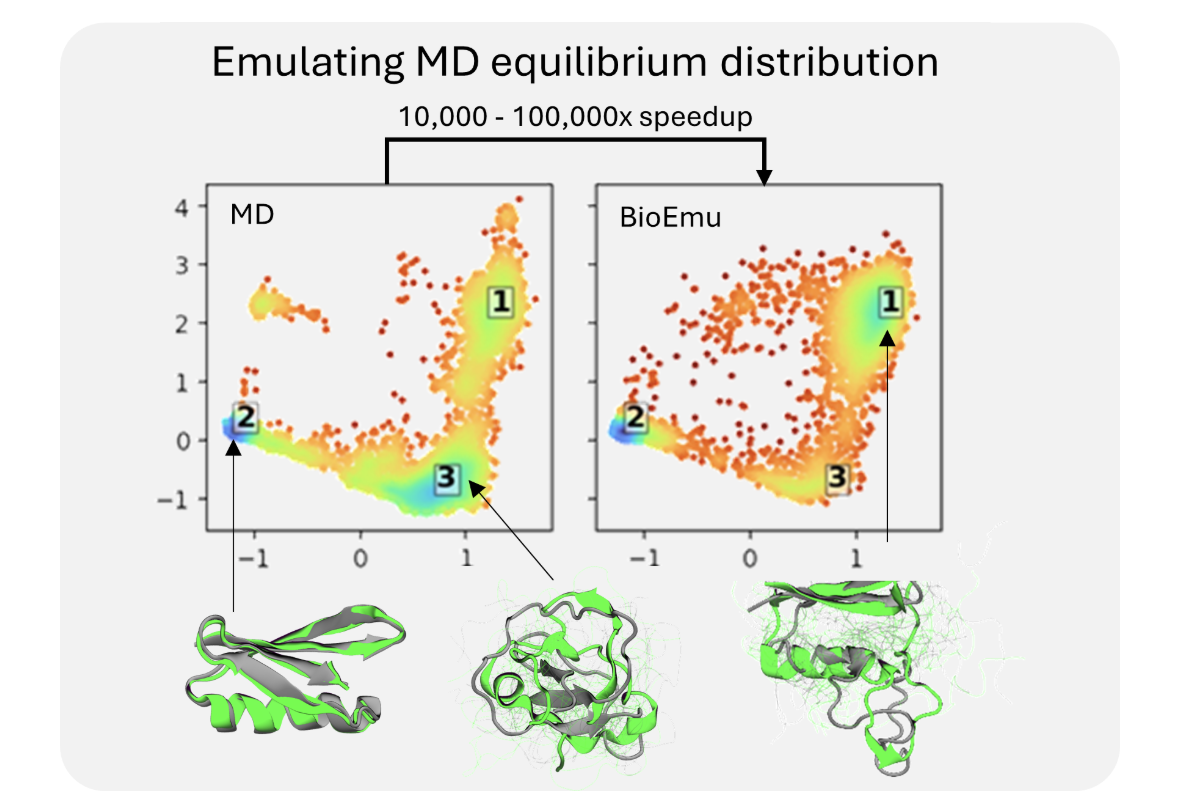
Proteins play a crucial role in nearly all biological processes, including catalyzing reactions and transmitting signals within cells. While advancements like AlphaFold have improved our ability to predict static protein structures, a significant challenge remains: understanding how proteins behave dynamically. Proteins exist in various conformations that are vital for their functions. Traditional methods, such as cryo-electron microscopy and single-molecule studies, only provide snapshots of these movements and can be resource-intensive. Additionally, molecular dynamics (MD) simulations, although informative, are expensive in terms of computational power. Therefore, an efficient and accurate method for modeling protein dynamics is essential, particularly in drug discovery and protein engineering, where an understanding of these motions can lead to improved design strategies.
Microsoft Researchers have developed BioEmu-1, a deep learning model capable of generating thousands of protein structures every hour. Unlike traditional MD simulations, BioEmu-1 uses a diffusion-based generative framework to imitate the equilibrium ensemble of protein conformations. This model integrates data from static structural databases, extensive MD simulations, and experimental stability measurements. As a result, BioEmu-1 can produce a diverse array of protein structures, reflecting both major rearrangements and subtle conformational changes. The computational efficiency of this approach makes it practical for routine use, providing a new tool for studying protein dynamics without the heavy computational burden.
The foundation of BioEmu-1 lies in its combination of advanced deep learning techniques and established principles from protein biophysics. It encodes a protein’s sequence using methods inspired by AlphaFold and processes this information through a denoising diffusion model that generates a variety of plausible protein conformations. A significant technical enhancement is the use of a second-order integration scheme, which allows the model to produce high-quality outputs in fewer steps. Consequently, it can generate up to 10,000 independent protein structures on a single GPU in a matter of minutes to hours, depending on the size of the protein.
BioEmu-1 is meticulously calibrated using a mix of diverse data sources, enabling it to estimate the relative free energies of different conformations with a precision nearing that of experimental results. This thoughtful integration not only enhances the model’s reliability but also makes it applicable to a wide array of proteins and conditions.
In comparative evaluations with traditional MD simulations and experimental benchmarks, BioEmu-1 has successfully captured various protein conformational changes. For instance, it accurately models the open-close transitions of enzymes like adenylate kinase and local unfolding events in proteins such as Ras p21, which is vital in cell signaling. Moreover, BioEmu-1 can identify transient “cryptic” binding pockets that are often missed by conventional techniques, providing insights that can aid drug design.
In terms of performance, the free energy landscapes produced by BioEmu-1 demonstrated a mean absolute error of less than 1 kcal/mol when compared to extensive MD simulations. Furthermore, the computational requirements are significantly lower, often taking less than a single GPU-hour for typical experiments, compared to the thousands of GPU-hours needed for MD simulations. These findings suggest that BioEmu-1 is an effective and efficient tool for exploring protein dynamics, delivering accurate insights in a more accessible manner.
In conclusion, BioEmu-1 represents a significant advancement in the computational study of protein dynamics. By merging diverse data sources with a deep learning framework, it provides a practical method for generating detailed protein ensembles at a fraction of the time and cost associated with traditional MD simulations. This model enhances our understanding of protein shape changes in response to various conditions, ultimately supporting better decision-making in drug discovery and protein engineering.
While BioEmu-1 currently focuses on single protein chains under specific conditions, its design paves the way for future adaptations. With additional data and continuous refinement, it could eventually handle more complex systems, such as membrane proteins or multi-protein complexes, and incorporate other environmental parameters. As it stands, BioEmu-1 offers researchers a balanced and efficient tool, providing deeper insights into the dynamics that govern protein function.
In summary, BioEmu-1 exemplifies the thoughtful integration of modern deep learning and traditional biophysical methods, addressing a long-standing challenge in protein science and opening up promising avenues for future research and practical applications.
Explore how artificial intelligence can transform your business operations. Identify processes that can be automated and moments in customer interactions where AI can add the most value. Establish key performance indicators (KPIs) to ensure that your AI investments yield positive business impacts. Choose tools that fit your needs and allow customization to align with your objectives. Start with a small project, assess its effectiveness, and gradually expand your AI implementation.
If you need assistance in managing AI in business, contact us at hello@itinai.ru. Follow us on Telegram at https://t.me/itinai, on X at https://x.com/vlruso, and on LinkedIn at https://www.linkedin.com/company/itinai/.




























